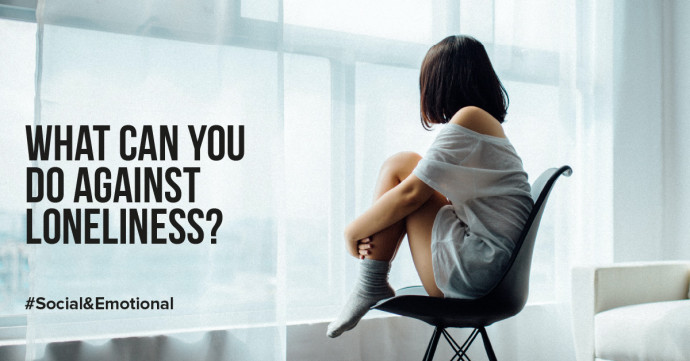What can you do against loneliness?
More than 43% of the adult population in the West experience the feeling of loneliness. The vast majority of them are actually lonely. The studies are not yet up to date enough to give an insight into how high this percentage is during the corona lock-down, but the cautious estimates show alarming figures. What can you do against loneliness?

Loneliness is a stealthy killer
Loneliness is often underestimated by people who don't have to deal with it and is a stealthy killer. Research after research shows that loneliness can lead to severe mental as well as physical health complaints. It can lead to a severe form of depression, but it also increases the risk of cardiovascular disease, Alzheimer's disease, and obesity.
From a medical point of view, loneliness is rarely or never mentioned as a cause of death. For example, it is difficult to prove that suicide was directly caused by loneliness. Let alone prove that a lonely existence caused the heart attack. But that does not mean that loneliness did not play a significant role in such cases.
Research shows that lonely people grow less old than people with vibrant social life.
There are two kinds of loneliness
When talking about loneliness, we have to distinguish between social loneliness and emotional loneliness.
-
Social loneliness means that someone has little or no social contact.
-
Emotional loneliness means that someone does have social contacts, but has little or no emotional connection with them.
Indeed, during the corona lock-down, it happens more and more often than people with emotional loneliness shift to social loneliness. These feelings are also often accompanied by mild or more intense depression symptoms. It does not mean that the person is already depressed, but it does evoke the same kind of emotions and symptoms.
Loneliness, just like depression, can lead to lethargy and the feeling of being stuck in something.
How does loneliness arise?
Loneliness, just like depression, does not come about by itself. Sure - sometimes consecutive - events have to take place to become lonely. The person may cause some of these events and others not.
Events over which you have influence that can lead to loneliness:
- Stop contacting family, friends or acquaintances
- Stop attending social events
- Consciously keep away from people and don't bother making new friends
- Staying at home a lot while you can go outside
- Addiction that makes your environment turn away from you
- Aggressive, violent or other antisocial behavior that turns your surroundings away from you
The person forces himself, as it were, through the above actions into social isolation.
Events over which you have no influence that can lead to loneliness:
- The death of one or more loved ones
- Physical or mental disability due to an illness or condition
- Fear of people caused by trauma such as abuse or domestic violence
It allows the person to become socially isolated without having any influence on it.
Like depression, loneliness can be prevented and remedied
Loneliness can be limited by external help and attention from family, friends, and acquaintances, but can only be remedied by professional help and the person himself. The person must first have a request for help to escape from the loneliness. As long as there is no request for help, bystanders can do little.
Because lonely people often suffer from depression without even realizing it, it can happen that the person doesn't want anything anymore. Symptoms of depression are lethargy, hopelessness, and powerlessness.
From that state of being, the person is rarely able to formulate a request for help. In this case, support from the environment can help to start a conversation with a depression coach or therapist.
Condition for the support from the environment is that it is not too forceful. Grass does not grow faster by pulling on it. Grass does grow faster through attention and care.
How can you avoid loneliness?
People are social beings, and to avoid loneliness, it is crucial to be and remain aware that we need people around us to be happy. It is not about the number of people, but about the intensity of the relationship with the people around you.
Convinced of the fact that people need other people, everyone knows how to make and maintain contact. The latter is, therefore, the key to preventing loneliness, creating, and maintaining social contacts.
In human life, we can sometimes lose a lot of social contacts consciously or unconsciously. Usually, that would not have been necessary at all, and several behaviors or limiting beliefs stand in the way of approaching these contacts again.
Why do we lose old friends and acquaintances?
- Not being able or willing to forgive
- Fear of being rejected because no one's waiting for you
- The belief that only your way of living and thinking is the right one
- Not being able to let go of the past, or to discuss it
- Not seeking help for an addiction or antisocial behavior
How can you overcome loneliness?
Depending on the degree of loneliness and how long someone has been lonely, a person can overcome this with professional help or by taking action themselves.
Solving loneliness with professional help
A life coach or therapist can give someone who feels lonely insight into what actions the person can take to escape from the loneliness. Especially when obstructive beliefs are the cause of loneliness, professional help offers a solution.
Solving loneliness by taking action yourself
The cure for loneliness is having valuable social contacts. Establishing close relationships with family, friends, or acquaintances is the only thing that helps. It means that you have to put your energy into it. You can hardly expect people to come to you all the time.
Loneliness can, therefore, rarely be solved from your living room. Solving loneliness is done by approaching people. If this is not possible due to circumstances, a letter, e-mail, postcard, or text message is also the first step.
By keeping in regular and continuous contact with family, (old) friends and acquaintances, a social network of people you can care about will be created. At the same time, you will notice that many of them will also care about you.
If someone has been lonely for a long time, this may feel fake or artificial in the beginning. That doesn't mean that it is fake or artificial because children don't do anything else. Young children walk up to any other child and make new friends within a second. Lonely people have lost this skill, and any skill that is lost can be learned again by practicing.
Listen to this article as a Podcast here:
-
Mursal AhmadiPsychologist / CoachUS$ 1,41 pm
-
Shane van WeeliePsychologistUS$ 1,10 pm
-
Michelle MéndezHelping othersUS$ 0,17 pm
-
Monisha DoleyLife coach, authorUS$ 0,80 pm
-
Nilufar ArmakiPsychotherapistUS$ 1,13 pm
-
Carly KafkaTeacher!!US$ 0,15 pm


































